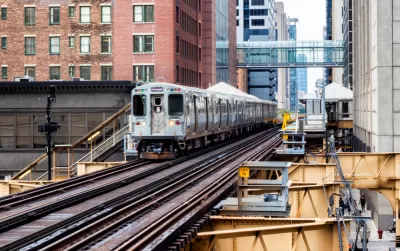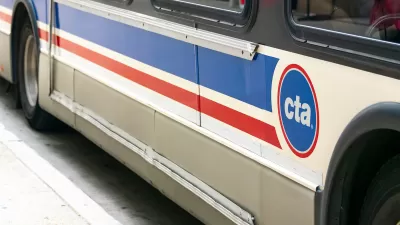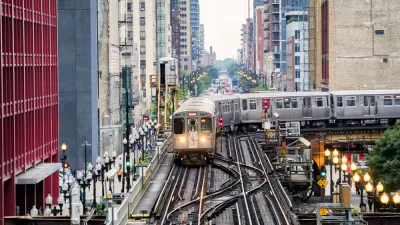The region’s transit riders could see major fare hikes and reduced service if agencies don’t find new ways to make up for reduced fare revenues.

Without new funding sources, the Chicago Transit Authority could be forced to raise fares and reduce service by 2026, warns Dan Zukowski in Smart Cities Dive.
The Regional Transportation Authority of Northern Illinois acknowledges the heavy reliance of Chicago-area transit agencies on fare revenue is unsustainable. The agency faces a $730 million budget shortfall in 2026.
The RTA released a five-year strategic plan that seeks to address this and other problems facing the region’s transit. “Advocacy issues include finding additional funding for transit operations and infrastructure that reduce the Authority’s reliance on the farebox. Action items aim to address public safety concerns, accessibility, customer convenience and transitioning to a near-zero emission regional transit system.”
If the plan fails to gain political support and bring in the needed funding, Zukowski explains, “One-way fares for Chicago Transit Authority elevated trains, Metra trains and Pace buses would double. That would make Chicago’s trains and buses some of the most expensive in the country, the RTA states in the plan document.” The plan admits that this could backfire and lead to even lower ridership.
Zukowski points out the long history of public transit in Chicago, where the first elevated train began running in 1892 and more than a million people use the region’s trains and buses daily.
FULL STORY: Chicago transit users could see fare hikes, service cuts without new funding sources

Trump Administration Could Effectively End Housing Voucher Program
Federal officials are eyeing major cuts to the Section 8 program that helps millions of low-income households pay rent.

Planetizen Federal Action Tracker
A weekly monitor of how Trump’s orders and actions are impacting planners and planning in America.

Ken Jennings Launches Transit Web Series
The Jeopardy champ wants you to ride public transit.

Washington Legislature Passes Rent Increase Cap
A bill that caps rent increases at 7 percent plus inflation is headed to the governor’s desk.

From Planning to Action: How LA County Is Rethinking Climate Resilience
Chief Sustainability Officer Rita Kampalath outlines the County’s shift from planning to implementation in its climate resilience efforts, emphasizing cross-departmental coordination, updated recovery strategies, and the need for flexible funding.

New Mexico Aging Department Commits to Helping Seniors Age ‘In Place’ and ‘Autonomously’ in New Draft Plan
As New Mexico’s population of seniors continues to grow, the state’s aging department is proposing expanded initiatives to help seniors maintain their autonomy while also supporting family caregivers.
Urban Design for Planners 1: Software Tools
This six-course series explores essential urban design concepts using open source software and equips planners with the tools they need to participate fully in the urban design process.
Planning for Universal Design
Learn the tools for implementing Universal Design in planning regulations.
Heyer Gruel & Associates PA
Ada County Highway District
Institute for Housing and Urban Development Studies (IHS)
City of Grandview
Harvard GSD Executive Education
Toledo-Lucas County Plan Commissions
Salt Lake City
NYU Wagner Graduate School of Public Service





























